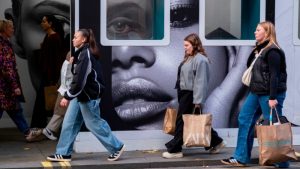Do audiobooks count as reading?
Unlock the Editor’s Digest for free
Roula Khalaf, Editor of the FT, selects her favourite stories in this weekly newsletter.
Heard a good book lately? Audiobooks, once scorned by purists as the fake Rolexes of the reading world — widely available, often well made, but not the real thing — are fast gaining ground. And as a result, what it means to be a reader has changed.
Like many in their forties and fifties who grew up reading physical books, I tested out audiobooks gingerly some years ago. I love books: the pleasure of turning a page, skipping back and forth, the tactile enjoyment of a well-chosen font, creamy paper, a beautiful book cover. Audiobooks, by contrast, were all about the seductions of voice.
Stephen Fry nailed the deadpan jokes in Douglas Adams’ The Hitchhiker’s Guide to the Galaxy, and I warmed to Bahni Turpin, a superb narrator and a Golden Voice awardee, who brings her depth to novels such as James Baldwin’s If Beale Street Could Talk and Tomi Adeyemi’s Children of Blood and Bone. After a day of reading manuscripts, listening to a novel gave my eyes a rest — and felt like a return to the childhood pleasure of having someone else read you a story.
The numbers are eloquent. In the US, 52 per cent of adults have listened to an audiobook, and revenue from the audiobook market jumped to $2bn in 2023, according to a 2024 consumer survey released by the Audio Publishers Association. The UK audiobook market crossed £1bn in 2023, according to industry magazine The Bookseller, and from Audible to Downpour, Kobo and more recently, Spotify, audiobook sites have become as necessary to many readers as physical bookstores.
As Karl Berglund, author and assistant professor in literature at Sweden’s Uppsala University, writes in his book Reading Audio Readers, “Though audiobook streams are skyrocketing, print book sales are not declining. What appears to be happening is that people are expanding how they make use of literature, what reading is and can be.”
Unsurprisingly, there’s an age gap — many surveys show that children like, respond to and learn vocabulary from audiobooks, while 51 per cent of frequent listeners are between the ages of 18 and 44. Older readers might remain hidebound in their insistence that a book means a physical (or digital) book, but browsing forums, I felt that most readers in their twenties and thirties were format-agnostic: the story and the narration matters to them far more than any battle over text versus voice.
FT Edit
This article was featured in FT Edit, a daily selection of eight stories to inform, inspire and delight, free to read for 30 days. Explore FT Edit here ➼
Is there truly a big difference between listening and reading? When you write, you “hear” sentences in your head, and reading back what you’ve written, you taste, see, feel the scene — if you’ve got it right.
I read perhaps more neuroscience papers than is entirely wise, my brain spinning from references to the fusiform gyrus, the superior temporal gyrus and modality fingerprints — but broadly, most research shows that the brain reacts very similarly to reading, whether our eyes are scanning a page, or whether we’re listening to a story. What matters most is the attention you bring to a book; and to suggest that reading physical books is the only kind of reading that counts also does a disservice to the many dyslexic or visually challenged booklovers among us.
And as the National Literacy Trust in the UK notes, parents often prefer their kids to listen to audiobooks because it gives them a break from screentime. Berglund identified three kinds of audiobook listeners, with similar quirks to devotees of the physical book: repeaters listen to the same books over and over again, preferably at night; swappers try out lots of books, only to abandon some and move on to others; constant listeners binge on audiobooks all the time.
Some readers turn to audiobooks for everything — non-fiction, true crime, histories and biographies, short stories, novels. I can’t do that; I read swiftly, and slow down with audiobooks, unable to skim through a pile of books, annoyed at having to manually rewind rather than flip back a few pages. What I want from an audiobook is sensory and intellectual pleasure, where the narrator becomes translator, interpreter and actor all in one, like Tom Hanks reading Ann Patchett’s The Dutch House.
Another favourite narrator, Adjoa Andoh, the acclaimed actress, has recorded more than 150 audiobooks, from the complete Jane Austen to Lauren Groff’s Matrix. In a 2022 interview to AudioFile magazine, she said, “Recognize what an intimate medium it is. It’s your voice, the writer’s imagination, and the listener’s attention.” That is exactly what reading a paper book claims — your imagination, and your attention. Audiobooks feel like a parallel way to read, rather than a lesser form of reading; a return to the old compact between the listener who demands “Tell me a story”, and the teller who responds with “Once upon a time”.
Join our online book group on Facebook at FT Books Café and subscribe to our podcast Life and Art wherever you listen
#audiobooks #count #reading




